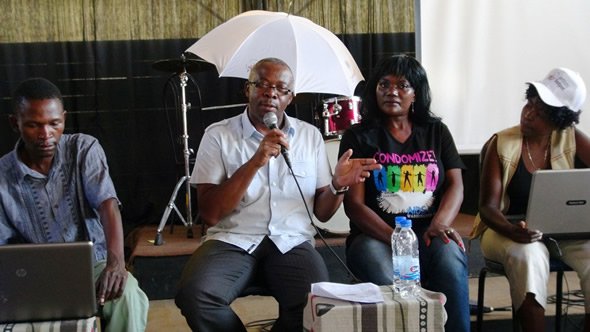The United States is supporting efforts by the Zimbabwean arts community to promote HIV/AIDS prevention among its members by using discussions and educational activities targeted at the sector.

Artists, mostly from the theatre sector, and an HIV/ AIDS campaigner met on Friday, November 23, at Harare’s Book Café in the fourth such HIV/AIDS prevention meeting (although it was the first in Harare).
The series of discussions, dubbed “Artists’ Hotpots”, started in August this year with support from United States Embassy through the U.S. President’s Emergency Fund for AIDS Relief (PEPFAR).
“I see artists as celebrities, who have been marginalized (and left out of)…HIV/ AIDS interventions,” said veteran HIV/ AIDS campaigner Tendai Westerhof during the discussion.
“They attract a lot of attention, which exposes them to the risk of HIV, but are forgotten in community prevention efforts because they are busy rehearsing and performing.”
Westerhof, who has authored two books detailing her encounter with HIV and AIDS, explained how the virus is transmitted and highlighted proven transmission prevention strategies.
“Female artists, like all women, are more prone to HIV infection than men,” said Westerhof citing biological differences and gender based imbalances in negotiating safe sex.
The discussion session at the Book Café was the first in Harare following others held in Masvingo, Bulawayo and Chimanimani. It was facilitated by Xpressions Media and coordinated by director Leeroy Gono.
“The series seeks to empower and safeguard the rights of artists by mobilizing and engaging the arts Community in fighting HIV and AIDS through objective dialogue leading to the holistic development of the arts industry in Zimbabwe,” said Gono.
“HIV/AIDS outreach initiatives run by and for specific groups can be highly effective in raising awareness and building support for positive behavior change,” said Sharon Hudson-Dean, the U.S. Embassy’s Counselor for Public Affairs, about the concept of industry-specific HIV/AIDS outreach.
“If members of a certain sector of society – in this case the cultural sector – work together, they can greatly increase their ability to eliminate stigma and to spread the information that will eventually get us to an AIDS-free generation.”
Such initiatives are not new, noted veteran theatre producer Daves Guzha of Rooftop Promotions. “There is a declaration signed by over 50 artists, where they were requesting for their own testing unit,” said Guzha.
“In 2008, we started the SADC artists AIDS Festival, eventually adopted by the SADC secretariat, to enable artists who are being paid to perform by everyone and never viewed or seen themselves as victims to put the spotlight on them.”
In 2006, musicians collaborated to produce a theme song on HIV and AIDS, said Guzha. Young artists felt strongly about the need for a unified approach to tackling common problems.
“We don’t have a union to represent us as artists, which is why there are fights all over. Most of the time artists are crying foul when we are to blame,” said actress and theatre producer Eunice Tava. She said lack of support from government had affected the theatre industry.
“Our government is giving all the support to the music community. We have had over four (musical) galas, which receive government funding. Imagine our strength if we had theatrical events supported by the government.”
Another theatre producer and director, Tafadzwa Muzondo, said efforts to stem the tide of HIV and AIDS in the arts sector stalled because there is no will to collectively work together as a result of competition.
“We see ourselves as competitors,” he noted. “Fine it’s healthy, but there are issues that pertain to the industry in general that have to be dealt with collectively just like what banks do.”
With the country preparing to commemorate this year’s World AIDS Day on December 1 under the slogan “Getting to Zero”, Westerhof says artists must be proactive and demand services from governmental and non-governmental bodies.
“We are not seeing artists trying to get involved. It’s like they wait for services to come to them. (They) have a right to information about HIV and AIDS,” said the HIV/AIDS activist.
“We want to see artists being proactive. We want to see them work with the National AIDS Council and other HIV/AIDS service organizations in the country.”
While the United Nations says new HIV infection rates have dropped by 50 percent in Zimbabwe, the country still has 1.2 million people living with the virus- ZimPAS © 2012





